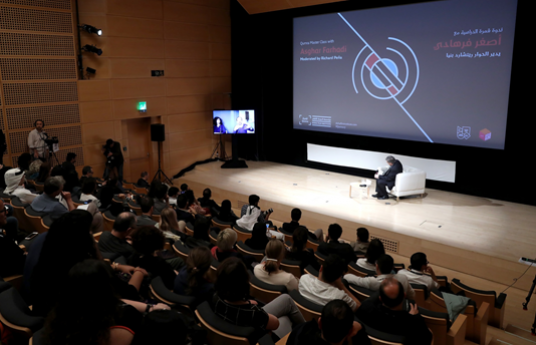Qumra 2017 Master and Two Time Oscar® Winner Asghar Farhadi discusses how he brings realism to film
Mar 07, 2017

Doha, Qatar; March 7, 2017: Oscar®-winning filmmaker Asghar Farhadi delivered his Master Class at Qumra 2017 today, his first public speaking event since his Best Foreign Language Film victory at the recent Academy Awards®. In front of a packed house, of filmmakers, industry guests and delegates he shared his thoughts and insight on filmmaking, including techniques he borrows from his theatre background, that enable him to create films and stories reflecting the realities of everyday life.
The highly anticipated discussion, exemplified Farhadi’s ability to master the ordinary, which has gained the filmmaker two Best Foreign Language Film Oscars® – his first for The Separation (2012) and the second, last month for The Salesman (2017) which was supported by the Doha Film Institute (DFI). The Oscar® wins are amongst numerous international awards and accolades he has received over the last few years.
Sharing details about how he sources inspiration, to stressing the importance of rhythm within dialogue, combined with the use of music, Farhadi underlined the fact that the key to presenting insightful storytelling is an eye for detail. Turning his attention to the realism in his films, Farhadi went on to discuss how the placement of the camera can hugely affect the audience’s interpretation, and singular perspective, of a scene.
He elaborated on his belief that it is the director’s responsibility to tell the whole story. “If your camera always follows one actor, you’re creating a biased viewpoint. We give the audience all the information. It’s up to them to make the judgement.” He expanded on this, emphasizing it is not his characters that determine the story, it’s often one initial thought or a scenario that drives the film forward.
On summing up his own unique way of working Farhadi ended by saying “My process for writing is usually in two parts: the conscious and the unconscious. The conscious is much like the password that can unlock the bank of your unconscious. This first idea sparks all those bits and pieces in the back of your mind.”
Farhadi’s films rely upon strikingly naturalistic performances. His characters are developed much later together with the actors, who come together for the initial rehearsals to develop a back story about their past and their relationships to each other.
Before shooting any footage, the actors act out scenes from their ‘past’, from the time they may have studied together or from early childhood. Farhadi says these details help the couples and cast form believable relationships, from subtleties such as the way they look at each other to the nuances in conversation, and the audience feels the connection and believes this is real life.
His latest film, The Salesman allowed Farhadi to return to his theatrical roots. The film tells the story of a couple who are acting together in Arthur Miller’s play Death of a Salesman. Farhadi chose specific scenes from Miller’s play to explicitly convey the emotional journey each character goes through after the wife is assaulted in her own apartment. Creating this play within a play blurs the lines of reality for the audience, making them question whether they are watching a film or real life.
Farhadi’s fourth feature-length film About Elly (2009) employs the same respectful but unsettling examination of interpersonal relationships that characterizes his works. The film was screened at Qumra 2017 as part of the Modern Masters Screening.
Qumra hosts leading international filmmakers, producers, industry experts and professionals, for intense brainstorming, knowledge-sharing and nurturing sessions with talents associated with 34 films from 25 countries. Directors and producers attached to 18 narrative feature films, 7 feature documentaries and 9 short films are participating in the event being held until March 8 at Souq Al Waqif and the Museum of Islamic Arts.